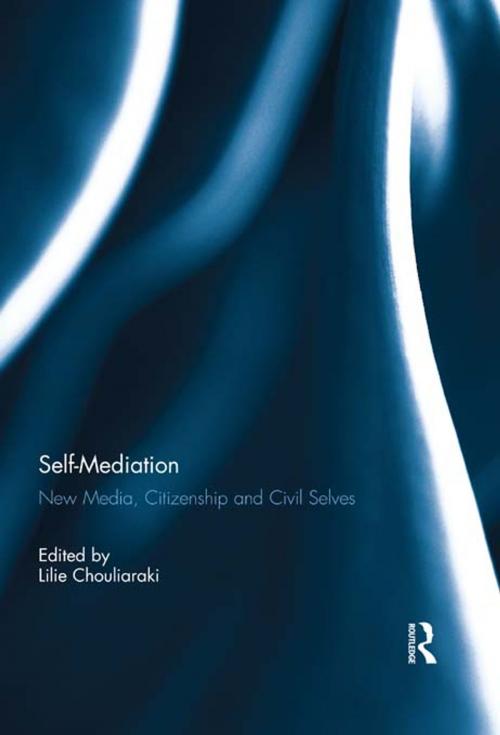Self-Mediation
New Media, Citizenship and Civil Selves
Nonfiction, Social & Cultural Studies, Social Science| Author: | ISBN: | 9781135746957 | |
| Publisher: | Taylor and Francis | Publication: | September 13, 2013 |
| Imprint: | Routledge | Language: | English |
| Author: | |
| ISBN: | 9781135746957 |
| Publisher: | Taylor and Francis |
| Publication: | September 13, 2013 |
| Imprint: | Routledge |
| Language: | English |
Blogs, You Tube, citizen journalism, social networking sites and museum interactivity are but a few of the new media options available for ordinary people to express themselves in public. This intensely technological presentation of everyday lives in our public culture is today hailed as a new, playful form of citizenship that enhances democratic participation and cosmopolitan solidarity. But is this celebration of self- mediation justified or premature?
Drawing on a view of self-mediation as a pluralistic practice that potentially enhances our democratic public culture but which is, at the same time, closely linked to the monopolistic interests of the market, this volume critically explores the dynamics of mediated self-representation as an essentially ambivalent cultural phenomenon. It is, the volume argues, the hybrid potential for increased democratization but also for subtler social control, inherent in the public visibility of the ordinary, which ultimately defines contemporary citizenship.
The volume is organized along two-dimensions, which conceptualize the dialectical relationship between new media and the participatory practices these enable in terms of, what Foucault calls, a dual economy of freedom and constraint (Foucault 1982). The first dimension of the dialectic, the ‘democratization of technology’ , addresses self-mediation from the perspective of the empowering potential of new technologies to invent novel discourses of counter-institutional resistance and activism (individual or collective); the second dimension, the ‘technologization of democracy’, addresses self-mediation from the perspective of the regulative potential of new technologies to control the discourses and genres of ordinary participation and, in so doing, to reproduce the institutional power relations that such participation seeks to challenge.
This book was originally published as a special issue of Critical Discourse Studies.
Blogs, You Tube, citizen journalism, social networking sites and museum interactivity are but a few of the new media options available for ordinary people to express themselves in public. This intensely technological presentation of everyday lives in our public culture is today hailed as a new, playful form of citizenship that enhances democratic participation and cosmopolitan solidarity. But is this celebration of self- mediation justified or premature?
Drawing on a view of self-mediation as a pluralistic practice that potentially enhances our democratic public culture but which is, at the same time, closely linked to the monopolistic interests of the market, this volume critically explores the dynamics of mediated self-representation as an essentially ambivalent cultural phenomenon. It is, the volume argues, the hybrid potential for increased democratization but also for subtler social control, inherent in the public visibility of the ordinary, which ultimately defines contemporary citizenship.
The volume is organized along two-dimensions, which conceptualize the dialectical relationship between new media and the participatory practices these enable in terms of, what Foucault calls, a dual economy of freedom and constraint (Foucault 1982). The first dimension of the dialectic, the ‘democratization of technology’ , addresses self-mediation from the perspective of the empowering potential of new technologies to invent novel discourses of counter-institutional resistance and activism (individual or collective); the second dimension, the ‘technologization of democracy’, addresses self-mediation from the perspective of the regulative potential of new technologies to control the discourses and genres of ordinary participation and, in so doing, to reproduce the institutional power relations that such participation seeks to challenge.
This book was originally published as a special issue of Critical Discourse Studies.















